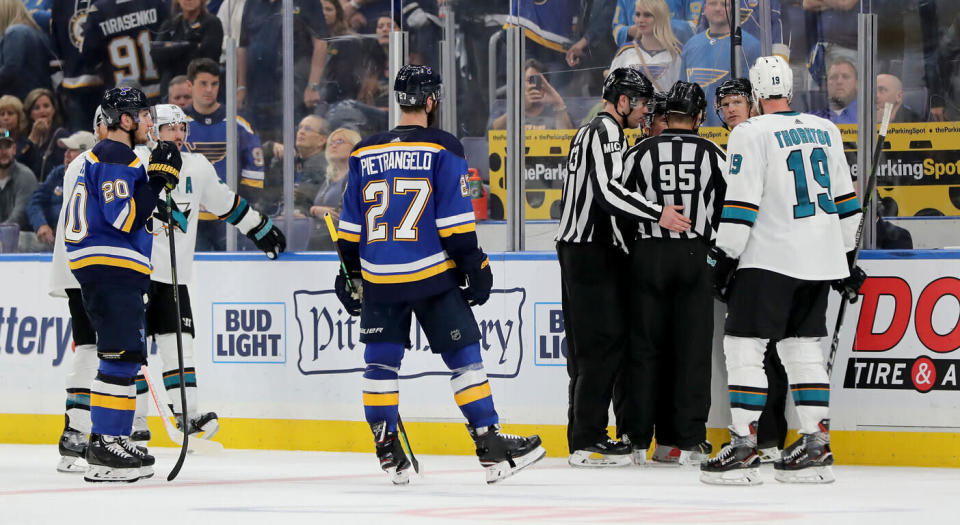It's clear NHL officials need more help than they're getting
Fans want answers, and the NHL isn’t offering them.
After the four officials working Wednesday’s Game 3 between the San Jose Sharks and St. Louis Blues missed a clear hand-pass from Timo Meier to Gustav Nyquist before Erik Karlsson’s overtime winner (which has compounded a relatively disastrous postseason for the league and its partners), NHL executive VP Colin Campbell asked more questions than he provided concrete answers for in a discussion with Sportsnet’s Hockey Central.
While Campbell did admit that the referees made the wrong call, he more or less rambled on about the complications the NHL is saddled with as it pertains to video review, rather than offer any real meaningful insight into how the NHL might change a system that is inherently broken, and undermining the most important hockey of the season.
On one hand, it’s understandable that those involved in the important discussions aren’t able to speak in absolutes.
But what you would want, as a fan, would be an admission that things must and will be changed.

An issue that’s simmered long before its explosion after the Karlsson goal, the limitations of the NHL’s video review system should be discussed at length in the offseason and between those with the clout to impact the game.
It is tricky, though, as it seems that every time the door is opened, things get worse.
When Matt Duchene was 10 feet offside before scoring in a meaningless regular season game, first bringing offside review to the fore, few expected to be splitting pixels and submitting frame-by-frame analysis to determine whether or not a goal scored, sometimes 30 seconds after, was indeed deposited legally.
Every action has a consequence, and the NHL needs to be very careful with the steps it takes to improve video review.
Hence Campbell’s rambling.
However, in the aftermath of Karlsson’s goal, the inconsistencies between reviewable and non-reviewable plays has emerged as a clear and fixable problem.
We have seen mistakes corrected since the postseason began, but we’ve also seen major penalties, hand-passes and pucks played off the netting lead directly to goals that wouldn’t have been possible without the benefit of human error.
And that’s just the thing: mistakes are inevitable. So for the NHL to consistently deliver fair and equitable results, a system has to be put in place where the referees always have something to fall back on and can avoid toeing the arbitrary line between what’s reviewable and what isn’t.
A situation like the one that played out last night — where referees, again without the permission to review the goal, could only shrug and exit the ice after failing to together unequivocally determine in real time that the puck was indeed moved along with a glove — simply cannot happen.
If it would trigger an immediate whistle, and isn’t up to interpretation, it should be subject to review.
Like an offside or puck kicked into the net, give coaches the ability to challenge a hand-pass in the offensive zone, or a high stick, or the puck hitting the netting and leading to a goal. There’s a larger discussion that needs to be had around penalties, but maybe even open it up for majors, just to make sure.
Get it wrong, lose the chance to protest for the remainder of the game.
Correct the officials, reserve the right to do it again.
Just because there’s less restrictions in the review process doesn’t mean the system has to be overly complex, or the game has to slow down.
Eliminating the guesswork on what is and what isn’t up for replay scrutiny is the first step in remedying the NHL’s review problem.
The second? Realizing that there’s a difference between a blown call in December and a blunder in the Stanley Cup Playoffs.
When the games mean this much, human error is simply unacceptable. What’s become abundantly clear is that beefing up the officiating team is necessary for the NHL to preserve the integrity of the competition.
The NHL needs to employ an overriding influence that, through either a direct line to the officials or separate means of communication, can correct mistakes made from the on-ice officiating team in the postseason.
A system where there’s supervision presiding over a game, over a series and its officials, and has the ability to immediately examine and detect the mistakes, and wield veto power, would have prevented the unjust result from Wednesday’s Game 3, and rescued the referees from the powerless position they found themselves in.
Because while it was an obvious missed call, the system failed the four officials that will have to answer for the injustice.
We can’t be sure that the outcomes in the playoffs will be just, and the efforts the athletes put in will be rightly rewarded, until the referees are working from a handbook free of arbitrary guidelines and are given the support they clearly need as they continue to stumble through the NHL’s postseason.
More NHL coverage on Yahoo Sports

 Yahoo Sports
Yahoo Sports 

